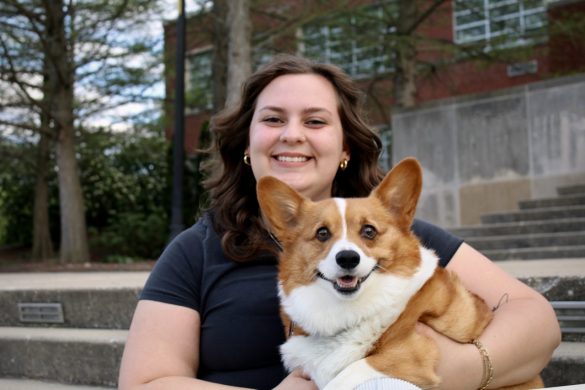Pro by Caroline Krauch | Sports Editor
When it comes to pets, there are basically no limitations in Indiana these days. If someone wanted to, they could even apply to have a bear as a pet (which is interesting, yet slightly terrifying). I once saw a video on Instagram of a woman who accidentally raised a panther as a pet thinking it was a cat, and then after growing an emotional bond, kept it, even when it was fully grown. In the State of Indiana, it is currently legal to own different wild animals as pets with a special permit. With hunting and trapping season coming up, I think it is important to address why I think having raccoons, in particular, as pets is a good thing.
Personally, my number one reservation about having a raccoon as a pet would be the legality of it. However, that is not an issue in Indiana—One could even apply to keep an eight-foot crocodile in the state if they wanted to. However, in order to make keeping a wild animal possible, one would have to fill out a Wild Animal Possession Permit Application from the Indiana Department of Natural Resources. The application must be filled out and turned in within five days of acquiring the animal, which makes sure the state is aware of the animal quickly. And, if the DNR has deemed raccoons safe enough pets to grant legal permits for them, then why argue against the experts?
According to the DNR, a raccoon can grow to anywhere from eight to 20 pounds. That is around the same size and weight of a small dog or domesticated cat, meaning a raccoon would not take up too much space. It would not absolutely need to have its own room like some larger animals would such as a horse, donkey, goat, etc.
According to WebMD, domesticated raccoons are able to be trained and can be affectionate companions over time, despite many people viewing them as violent creatures. Raccoons are of the rodent family which also includes animals such as guinea pigs, hamsters and mice. This means that, similarly to these animals, raccoons can also be trained and learn to bond with people.
Another misconception people have about raccoons is that they are carriers for disease. Yes, raccoons can carry diseases like any other animal that is typically found in the wild, but they are actually not the main carrier of diseases, such as rabies, like many people think, according to Undark—bats are actually more dangerous. The number of rabies cases has been decreasing since the 1970s after the country started programs to vaccinate wild animals, according to the United States Centers for Disease Control. And, like any other animal, a raccoon would need more immunizations as a pet that animals in the wild do not get. Also, if one keeps a raccoon as a legal pet in Indiana, they are required to purchase the animal from a licensed breeder and take it to a veterinarian for a health check and vaccines anyway.
There are plenty of practical reasons to keep a raccoon as well. Raccoons are omnivores, meaning they eat both plants and animals. This means that raccoon will eat basically anything, similar to a scavenger in the ocean. Raccoons have been known to eat bugs and pests in the wild—What person would not want a personal, in-home exterminator? The raccoon could eat any bugs or pests it sees in the house—and even outside—if that is where one is keeping their pet. Additionally, raccoons will eat basically any food you put in front of them, according to WebMD. Not only can someone save money by not having to buy specialized food for their pet, but they will have significantly less household food waste as well. One may never have to feel guilty about wasting food again since they would have their own garbage disposal in the form of a house pet. Those leftovers that went bad? The raccoon will eat it.
An interesting fact about raccoons is they have hands very similar to that of a human. This means that raccoons can do a lot of things that other animals cannot, such as holding objects or eating with their hands according to WebMD. Even though they may be eating someone else’s trash, they at least have the decency to wash it before they eat. The DNR also said that something raccoons do with their hands is wash them—and quite often. According to the DNR, raccoons’ paws have more sensitivity than most animals, and water is said to enhance their senses in their paws even more. This means that raccoons not only wash themselves, but they keep themselves clean and prefer to be clean because they can feel more. So while some may claim that raccoons are dirty, are there many other animals that wash their own hands?
With the limitations on pets now being so loose, it is hard to see the line between wild animal and domesticated. There is no one animal that is more qualified to be a pet than others in my opinion—raccoons included. Raccoons are misunderstood creatures that get a bad reputation just because they are not a typical pet, but there is no good reason they should not be. A pet is a companion to have and to love, and a raccoon is capable of these things if given the chance. Let us not worry about raccoons—People have venomous spiders and snakes as pets, for heaven’s sake!
Con by Olivia Hogsett | Staff Writer
In my experience, it is rare to come across someone who has a pet raccoon—-and for good reasons. Raccoons can be unpredictable, hostile, anti-social and scary looking, to say the least. However, Indiana regulations state that people can own raccoons as long as they come from a licensed breeder and buy a Wild Animal Permit, according to the Indiana Department of Natural Resources. As someone who loves animals, I do not think anyone should own a pet raccoon in Indiana or any state for various reasons, including safety for the animals and humans.
According to the website Pet Keen, “Raccoons are mischievous and unpredictable by nature and they can be aggressive. Even if you think you’ve tamed a wild raccoon, that animal can turn on you at any moment and deliver a wicked bite with its sharp teeth.”
Trying to tame this wild animal is a complete waste of time. A pet raccoon owner may spend much of their time training a raccoon just to be let down when the animal reverts back to its instincts. Additionally, a raccoon’s temperament can be heartbreaking to a human because after the owner thinks their pet is tamed, it can lash out at any moment, as if it were never trained at all.
Pet Keen also mentions that raccoons are much different from normal house pets. They cannot be completely domesticated and will oftentimes be unpredictable.
According to Pet Keen, “Unlike easily domesticated dogs, raccoons are not social and are animals that exhibit hostile and instinctual behaviors toward humans and other animals. While dogs easily bond with humans, raccoons are unable to form close emotional connections with humans even after several breeding attempts.”
According to Time, dogs have a form of sociability that makes them able to connect with humans. However, raccoons lack this sociability and that severely affects their ability to be good pets.
Health Fully says raccoons can carry diseases such as rabies, salmonella, roundworm and leptospirosis. Raccoons are also known to bite—even the “tamed” ones. Health Fully additionally says salmonella can be spread through raccoon feces and that roundworm eggs may also be present in their feces. The roundworm eggs, according to the article, “can lead to serious health issues in humans as they affect the central nervous system, and can impair the body’s organs, including the brain.” Although the DNR mandates that raccoons come from licensed breeders and that the animals visit a veterinarian after an ownership permit is issued, raccoons can still harbor diseases without signs or escape outside and get diseases from other animals.
Raccoons are nocturnal animals, according to the DNR. I question why someone would want a pet that is usually on the opposite sleep schedule of a typical person. A raccoon pet owner would need to put food out for the raccoon right before the owner goes to sleep to ensure that their pet is fed. I think this is nonsense. I strongly question how a person can adequately care for and enjoy a pet that is not awake when they are. And, it is worth mentioning that animals have biological circadian rhythms (A.K.A. sleep cycles) just like humans do, according to The National Library of Medicine. Lastly, it is illegal in most other states to keep a raccoon as a pet, according to World Population Review. According to WPR, pet raccoons are only legal in 19 out of 50 U.S. states. The other 31 states have laws in place that prohibit having a pet raccoon. Yes, raccoons may be legal as pets in Indiana, but if one takes their pet raccoon on a short trip to Kentucky without a Wildlife Transportation Permit from the state, they are now breaking Kentucky state law. The State of Indiana needs to reconsider legalizing raccoons as pets in the state due to the various problems the animals present to humans and themselves when put into a domestic setting. In the end, if you enjoy parasites, skin-breaking bites, scratches, heartbreak and not being able to play with your pet, a raccoon may be the pet for you!










